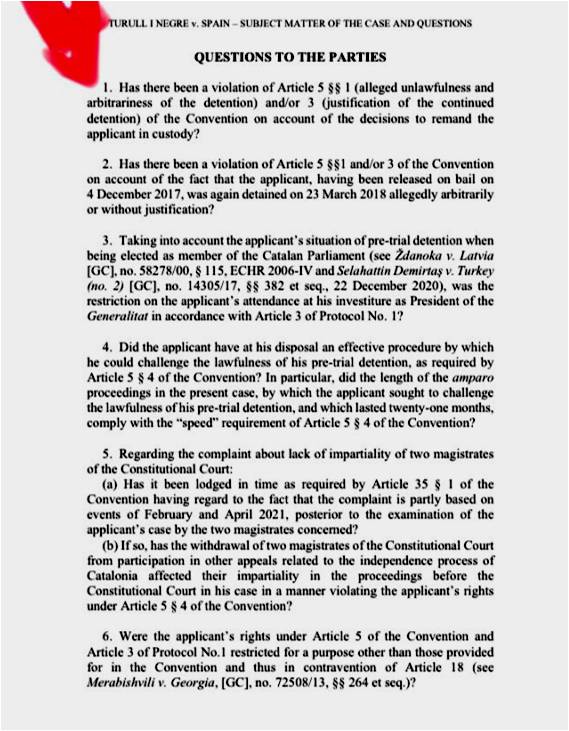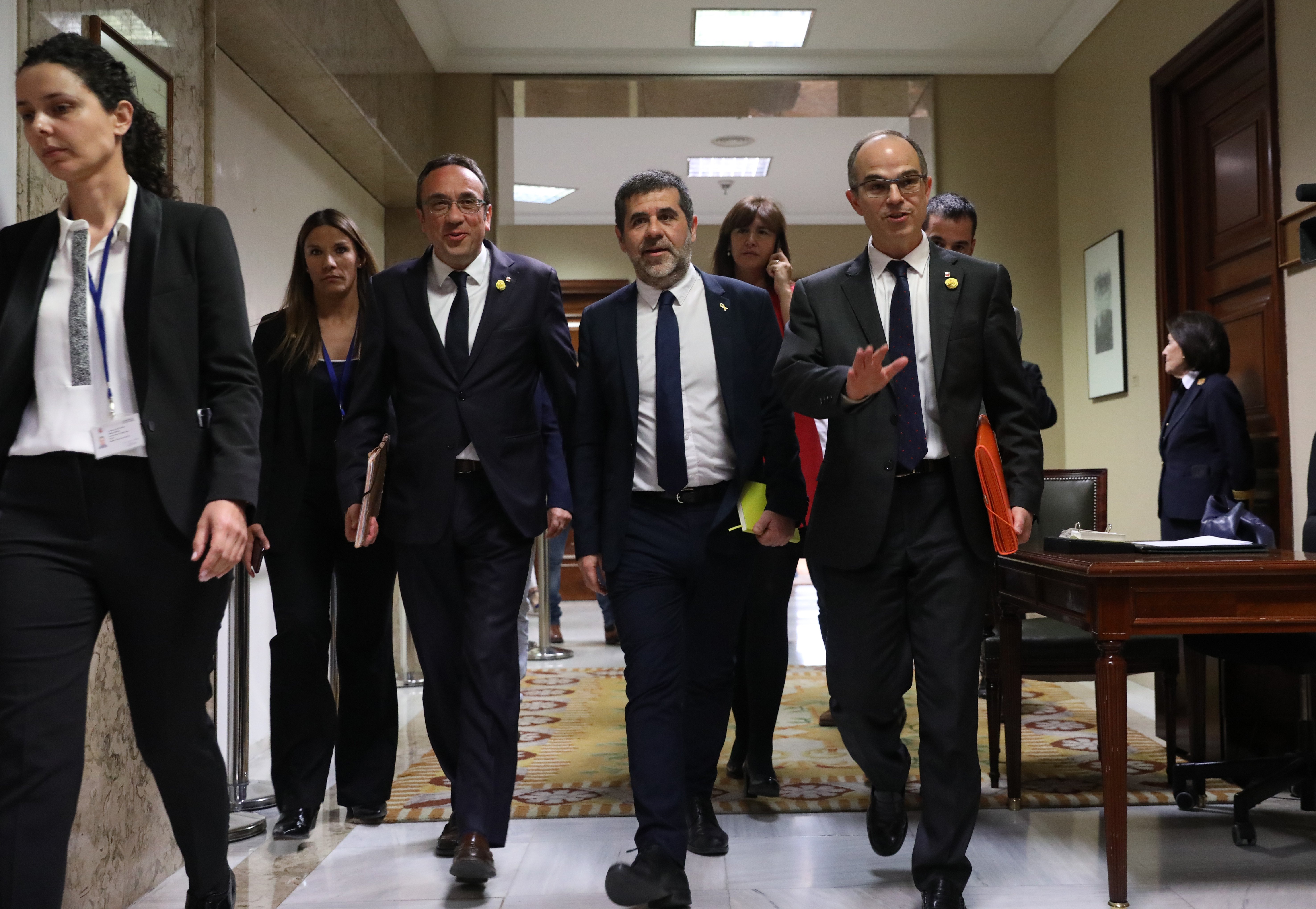A new legal battle in Europe. The European Court of Human Rights (ECHR) has agreed to hear the appeals presented by the former Catalan MPs Jordi Turull and Jordi Sànchez, which they presented in June 2020 against the Kingdom of Spain for having violated their political rights, specifically via decisions of the Spanish judicial authorities, as their lawyer Jordi Pina reported this Tuesday. The Spanish state solicitors, legal representatives of the Spanish government now have until September 1st to respond to the European court's questions aiming to clarify whether the Spanish courts violated the rights of the two former MPs for Together for Catalonia (Junts) because they are pro-independence Catalans, which is the motive that the two politicians allege.
Jordi Turull denounced the violation of the rights to liberty and political representation, recognized in the European Convention on Human Rights, in addition to "an obvious abuse of rights by the Spanish authorities". His lawyer recalls that Turull was a member of the Catalan Parliament and had been released on bail on charges relating to the 2017 Catalan referendum, when, "without any relevant event occurring", he was put in provisional prison by the Supreme Court on March 23rd, 2018, "when he was in the middle of the parliamentary investiture debate over his candidature to be the new president of Catalonia".
The jailing of presidential candidate Turull
The appeal reiterates that the imprisonment was decided despite the fact that "Turull had complied with all the precautionary measures" that, a few months earlier, had been imposed on him by the Supreme Court in the criminal proceedings in which he was being investigated. His lawyer states that Turull's prison "was part of a coordinated action by the Spanish public authorities with the aim of preventing a pro-independence MP from acceding to the presidency of Catalonia", since once Turull was imprisoned he had to renounce his candidacy and was deprived of his rights as a member of parliament.
For his part, Jordi Sànchez reported that his political rights were violated on five occasions by decisions of the Spanish judicial authorities. Sànchez, who was president of the pro-independence ANC civil group in 2017, and had been jailed preventively for sedition on October 16th of that year along with Jordi Cuixart, asserted that his rights were breached as a candidate to take part in the campaign for the Catalan elections of December 21st, 2017, and then, despite having been elected as a deputy, was banned from taking part in parliamentary debate, and from participating in the failed investiture of Jordi Turull, in March 2018. Finally, he was also suspended altogether as an MP after his charge was raised to rebellion, enabling suspension without a prior conviction under the controversial article 384 bis of the Criminal Justice Act. With these actions, Sànchez considers that his right to liberty and the right to take part in public affairs were violated. In fact, the UN Human Right Committee has just condemned the Spanish state for stripping Catalan president Carles Puigdemont of his MP status by applying this same article.
The questions to the Spanish government
This Tuesday afternoon Turull sent a tweet showing the questions that the Spanish state has been asked, about the actions of the courts, and especially of the Supreme Court investigating judge, Pablo Llarena, who applied the prohibitions to the prosecuted leaders, with endorsement from Supreme Court, and also by the Constitutional Court.
El TEDH m’ha acceptat la demanda contra l’Estat per l’empresonament en mig del debat investidura.
— Jordi Turull i Negre (@jorditurull) May 23, 2023
Ho vam dir i ho farem. Combatrem aquest activisme polític judicial de l’Estat contra l’independentisme a on calgui.
Les preguntes del TEDH a l’Estat són molt clares. 👇 pic.twitter.com/GsvQ2B2hF9
Translation of Tweet:
"The ECHR has accepted my appeal against the Spanish state for imprisonment in the middle of the investiture debate. We said it and we will do it. We will fight this judicial political activism of the state against the Catalan independence movement wherever necessary. The ECHR's questions to the State are very clear."— Jordi Turull i Negre

The bias of the courts
Jordi Pina, lawyer for the two politicians, was "very happy" that the appeal had been accepted for processing and highlighted two questions that the ECHR is effectively addressing to the Spanish government, one being "Why was Jordi Turull put in provisional prison if nothing had changed?” and the other, "Why did the Constitutional Court take 21 months to issue a ruling on the appeals for his constitutional rights in the case?” Pina notes that the Catalan political prisoners went on hunger strike to get a response from the Spanish court of guarantees. The case of another of the pro-independence prisoners, Josep Rull, has been presented to the United Nations Human Rights Committee, and that is why it cannot be taken to the ECHR at the same time.
The Catalan lawyer also points out that judge Llarena and the Supreme Court acted differently in two political campaigns, a fact that he alleges shows their bias: the prisoners were prevented from exercising their rights as Junts deputies in the Catalan Parliament and for the candidacy for the presidency of the Generalitat, where their votes were crucial; on the other hand, in the April 2019 Spanish general elections, they were able to campaign from prison and even their trial in the Supreme Court was stopped so that they could attend the Congress of Deputies, because, says Pina, in this chamber their votes and participation were not decisive.
In the main photo, Josep Rull, Jordi Sànchez and Jordi Turull were able to leave prison to attend Congress as deputies in 2019. / Photo: Europa Press

